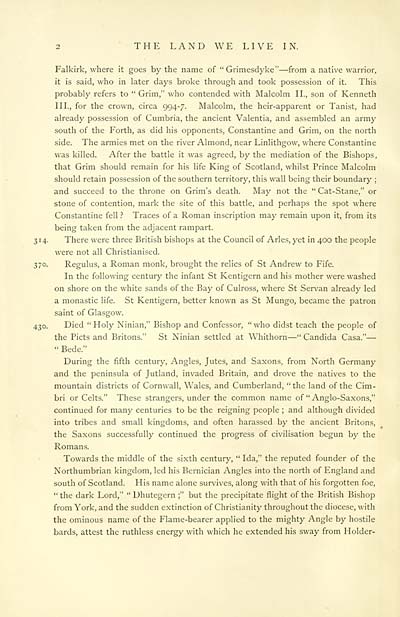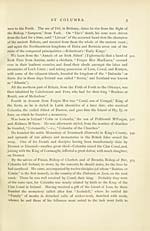Family records of the Bruces and the Cumyns
(14) Page 2
Download files
Complete book:
Individual page:
Thumbnail gallery: Grid view | List view

2 THE LAND WE LIVE IN.
Falkirk, where it goes by the name of "Grimesdyke" — from a native warrior,
it is said, who in later days broke through and took possession of it. This
probably refers to " Grim," who contended with Malcolm II., son of Kenneth
III., for the crown, circa 994-7. Malcolm, the heir-apparent or Tanist, had
already possession of Cumbria, the ancient Valentia, and assembled an army
south of the Forth, as did his opponents, Constantine and Grim, on the north
side. The armies met on the river Almond, near Linlithgow, where Constantine
was killed. After the battle it was agreed, by the mediation of the Bishops,
that Grim should remain for his life King of Scotland, whilst Prince Malcolm
should retain possession of the southern territory, this wall being their boundary ;
and succeed to the throne on Grim's death. May not the " Cat-Stane," or
stone of contention, mark the site of this battle, and perhaps the spot where
Constantine fell ? Traces of a Roman inscription may remain upon it, from its
being taken from the adjacent rampart.
314. There were three British bishops at the Council of Aries, yet in 400 the people
were not all Christianised.
370. Regulus, a Roman monk, brought the relics of St Andrew to Fife.
In the following century the infant St Kentigern and his mother were washed
on shore on the white sands of the Bay of Culross, where St Servan already led
a monastic life. St Kentigern, better known as St Mungo, became the patron
saint of Glasgow.
430. Died "Holy Ninian," Bishop and Confessor, "who didst teach the people of
the Picts and Britons." St Ninian settled at Whithorn — " Candida Casa." —
" Bede."
During the fifth century, Angles, Jutes, and Saxons, from North Germany
and the peninsula of Jutland, invaded Britain, and drove the natives to the
mountain districts of Cornwall, Wales, and Cumberland, "the land of the Cim-
bri or Celts." These strangers, under the common name of " Anglo-Saxons,"
continued for many centuries to be the reigning people ; and although divided
into tribes and small kingdoms, and often harassed by the ancient Britons,
the Saxons successfully continued the progress of civilisation begun by the
Romans.
Towards the middle of the sixth century, " Ida," the reputed founder of the
Northumbrian kingdom, led his Bernician Angles into the north of England and
south of Scotland. His name alone survives, along with that of his forgotten foe,
" the dark Lord," " Dhutegern ;" but the precipitate flight of the British Bishop
from York, and the sudden extinction of Christianity throughout the diocese, with
the ominous name of the Flame-bearer applied to the mighty Angle by hostile
bards, attest the ruthless energy with which he extended his sway from Holder-
Falkirk, where it goes by the name of "Grimesdyke" — from a native warrior,
it is said, who in later days broke through and took possession of it. This
probably refers to " Grim," who contended with Malcolm II., son of Kenneth
III., for the crown, circa 994-7. Malcolm, the heir-apparent or Tanist, had
already possession of Cumbria, the ancient Valentia, and assembled an army
south of the Forth, as did his opponents, Constantine and Grim, on the north
side. The armies met on the river Almond, near Linlithgow, where Constantine
was killed. After the battle it was agreed, by the mediation of the Bishops,
that Grim should remain for his life King of Scotland, whilst Prince Malcolm
should retain possession of the southern territory, this wall being their boundary ;
and succeed to the throne on Grim's death. May not the " Cat-Stane," or
stone of contention, mark the site of this battle, and perhaps the spot where
Constantine fell ? Traces of a Roman inscription may remain upon it, from its
being taken from the adjacent rampart.
314. There were three British bishops at the Council of Aries, yet in 400 the people
were not all Christianised.
370. Regulus, a Roman monk, brought the relics of St Andrew to Fife.
In the following century the infant St Kentigern and his mother were washed
on shore on the white sands of the Bay of Culross, where St Servan already led
a monastic life. St Kentigern, better known as St Mungo, became the patron
saint of Glasgow.
430. Died "Holy Ninian," Bishop and Confessor, "who didst teach the people of
the Picts and Britons." St Ninian settled at Whithorn — " Candida Casa." —
" Bede."
During the fifth century, Angles, Jutes, and Saxons, from North Germany
and the peninsula of Jutland, invaded Britain, and drove the natives to the
mountain districts of Cornwall, Wales, and Cumberland, "the land of the Cim-
bri or Celts." These strangers, under the common name of " Anglo-Saxons,"
continued for many centuries to be the reigning people ; and although divided
into tribes and small kingdoms, and often harassed by the ancient Britons,
the Saxons successfully continued the progress of civilisation begun by the
Romans.
Towards the middle of the sixth century, " Ida," the reputed founder of the
Northumbrian kingdom, led his Bernician Angles into the north of England and
south of Scotland. His name alone survives, along with that of his forgotten foe,
" the dark Lord," " Dhutegern ;" but the precipitate flight of the British Bishop
from York, and the sudden extinction of Christianity throughout the diocese, with
the ominous name of the Flame-bearer applied to the mighty Angle by hostile
bards, attest the ruthless energy with which he extended his sway from Holder-
Set display mode to:
![]() Universal Viewer |
Universal Viewer | ![]() Mirador |
Large image | Transcription
Mirador |
Large image | Transcription
Images and transcriptions on this page, including medium image downloads, may be used under the Creative Commons Attribution 4.0 International Licence unless otherwise stated. ![]()
| Histories of Scottish families > Family records of the Bruces and the Cumyns > (14) Page 2 |
|---|
| Permanent URL | https://digital.nls.uk/95071154 |
|---|
| Description | A selection of almost 400 printed items relating to the history of Scottish families, mostly dating from the 19th and early 20th centuries. Includes memoirs, genealogies and clan histories, with a few produced by emigrant families. The earliest family history goes back to AD 916. |
|---|
![[Page 1]](https://deriv.nls.uk/dcn4/9507/95071144.4.jpg)
